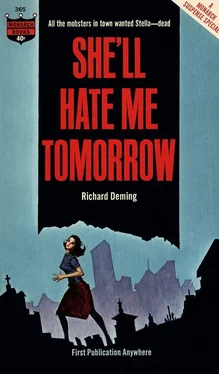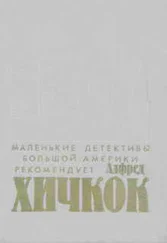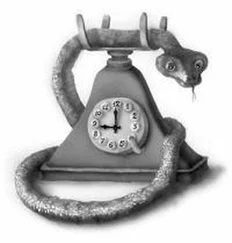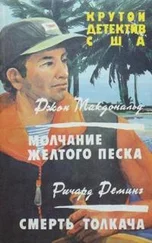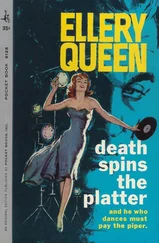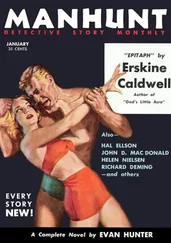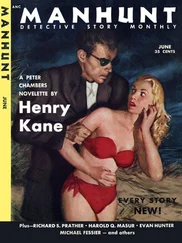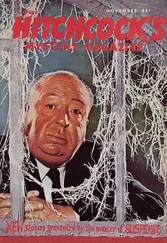While she had many acquaintances in and around Benton, she had no close friends to hold her there, and she headed for Chicago, got a night switchboard job at a hotel and enrolled in a six-month secretarial course.
Again, until she finished school at the top of her class and was hired by Carl Vegas, she had been too busy for social life. Now, at twenty-three, she had, for the first time since she was a teen-ager, time for a little social activity. But alone and practically friendless in a strange city, she hadn’t yet figured out how to go about making friends. Despite her rather joyless past few years, she wasn’t in the least bitter about what she had missed.
As a matter of fact, she looked forward with a kind of cheerful thankfulness to finally being able to have some fun out of life, and as yet her optimism was only slightly strained because no fun had developed after six whole weeks of free evenings.
Carl Vegas had drawn from her all this background during her first job interview. At the time she had taken it for mere friendly interest, but now she realized that one of the qualifications he had been looking for was complete isolation from everyone.
The lawyer said, “I want you to take a statement, Stella. I’m sure it isn’t necessary, but I want to impress on you that you are never to mention to anyone what I’m about to dictate.”
“Of course I won’t, Mr. Vegas.”
“Okay. This is to be in affidavit form. Usual heading and preamble. Body of statement as follows:
“At seven p.m. on October 27th last, a police informer named Otis (Lips) Taylor was killed by gunfire in the washroom of Tony’s Tavern on State Street. No witnesses to the crime could be located, and the case is listed by police as an unsolved homicide. The facts of the case are these:
“Otis Taylor had promised the office of the Cook County District Attorney some evidence proving that a certain Gerald (Whitey) Cord was the organizer and operator of Chicago’s wholesale narcotics racket. This evidence was in the form of photographs and a recording tape of meetings between Cord and certain international Syndicate officials whose names it is not necessary to mention here because the evidence has since been destroyed.
“Taylor sent word to the district attorney that he would take the evidence in a small suitcase to the washroom of Tony’s Tavern at seven p.m. on October 27th and there deliver it to a representative of the district attorney in return for a specified financial consideration. Unknown to Taylor, the friend by whom he sent this message was a plant of Gerald Cord’s, and the message was delivered to Cord instead.
“At six forty-five on the evening in question, Otis Taylor entered Tony’s Tavern and went straight to the washroom. This is a matter of police record. It is also in the police record that no one but the proprietor, Anthony Marzulla, was in the place at the time, and that he went down to the basement to tap a beer keg as Taylor entered the washroom. Marzulla stated that he heard the shots, but by the time he got upstairs the killer had fled and the only person present was the deceased, Taylor. Marzulla’s testimony was untrue.
“What actually happened was that Marzulla entered the washroom to change the roller towel an instant ahead of Taylor. Gerald Cord and his bodyguard, George (the Finger) Mott, both well known to the proprietor, were waiting there, having entered by the back door without Marzulla seeing them.
“When Taylor came in behind the proprietor, both Cord and Mott covered him with guns. Cord ordered Marzulla to leave the washroom and forget what he had seen. The proprietor complied, but as he was leaving the washroom, he heard Cord say to Mott, ‘This is my pigeon. I want to burn him personally.’
“A moment later there were four shots. When Cord and Mott stepped from the washroom immediately afterward, Cord was carrying the suitcase and still held a smoking gun. He put it away and both men walked from the place by the front door.
“Two customers at the bar, never mentioned by Marzulla in his statement to police, also saw the killer and his companion and saw Gerald Cord pocket the smoking gun. Both immediately left the place and were never questioned by police. Their names are Rodney Stewart and Henry Norse.”
Vegas paused for a moment, then said, “Both those men are listed in the phone book, Stella. Look them up and include their addresses.” He continued, “I know the details of this crime because fifteen minutes after the murder Gerald Cord and George Mott came to my home, explained exactly what had happened and asked my advice. Cord, who had known Tony Marzulla for years, said that the tavern proprietor would not talk, but he was concerned about the two customers. I advised him to get the names of the customers from Marzulla and give them to me. I promised to contact the men and learn their intentions.
“Cord phoned Marzulla, but as the police were at the tavern by then, could not state what he wanted. He merely left word for Marzulla to phone me when he could. About an hour later the tavern proprietor phoned and I got the customers’ names and addresses from him. I visited both men at their homes that same evening. Introducing myself only as a friend of Tony Marzulla, I said the tavern-keeper had sent me to find out what they intended doing about the affair they had witnessed at his tavern.
“Both stated that they wanted no involvement and hoped Marzulla would not mention them to the police. Both hedged when I asked if they recognized the killer, but I was reasonably certain they knew it was Whitey Cord. However, since I was satisfied that neither intended going to the police, I informed Cord that he needn’t worry about them.
“My evaluation of both men, based on many years of questioning witnesses, is that while they will never go to the police voluntarily, they would readily admit what they had seen if questioned by police. They haven’t been questioned to date simply because the police don’t know of their existence. It is also my belief that Marzulla would testify if confronted by the above-mentioned two witnesses, and that a conviction for murder could be obtained against Gerald Cord by the combined testimony of all three.”
The lawyer paused again, then said curtly, “Type that for my signature in one copy only and destroy your shorthand notes. When it’s finished, bring in your seal and I’ll have you notarize it. Also address an envelope to the Cook County District Attorney.”
Stella was trembling slightly when she rose. She left the office without a word, carefully closed the door behind her and stood staring into space for some time.
The statement she had just taken down in shorthand left her dazed and frightened. She had known, or at least suspected, that her employer counseled known criminals, but the knowledge that he was so deeply involved in their criminal activities shocked her beyond words. She supposed that the principle of privileged communication left Carl Vegas legally in the clear for not reporting Whitey Cord’s admission of guilt to the police, but didn’t his calling on the witnesses and making sure of their silence make him an accessory? Certainly lawyers weren’t expected to go to that extent to protect clients’ interests.
What was the purpose of the affidavit, she wondered? If Vegas mailed it to the district attorney, he would certainly suffer consequences himself. It seemed to her that he would, at the very least, risk disbarment proceedings, and possibly even go to jail.
It wasn’t a secretary’s duty to monitor her boss’ professional conduct, she finally decided. Rousing herself, she continued on to her desk, ran paper into her typewriter and mechanically began to type out the affidavit.
Fifteen minutes later Stella re-entered the private office and laid the affidavit and an addressed envelope on Vegas’ desk. After reading it over, he signed it and pushed it back to her. He watched as she signed the notary form and affixed her seal. Then he took the document back from her, folded it, placed it in the addressed envelope and sealed it.
Читать дальше
